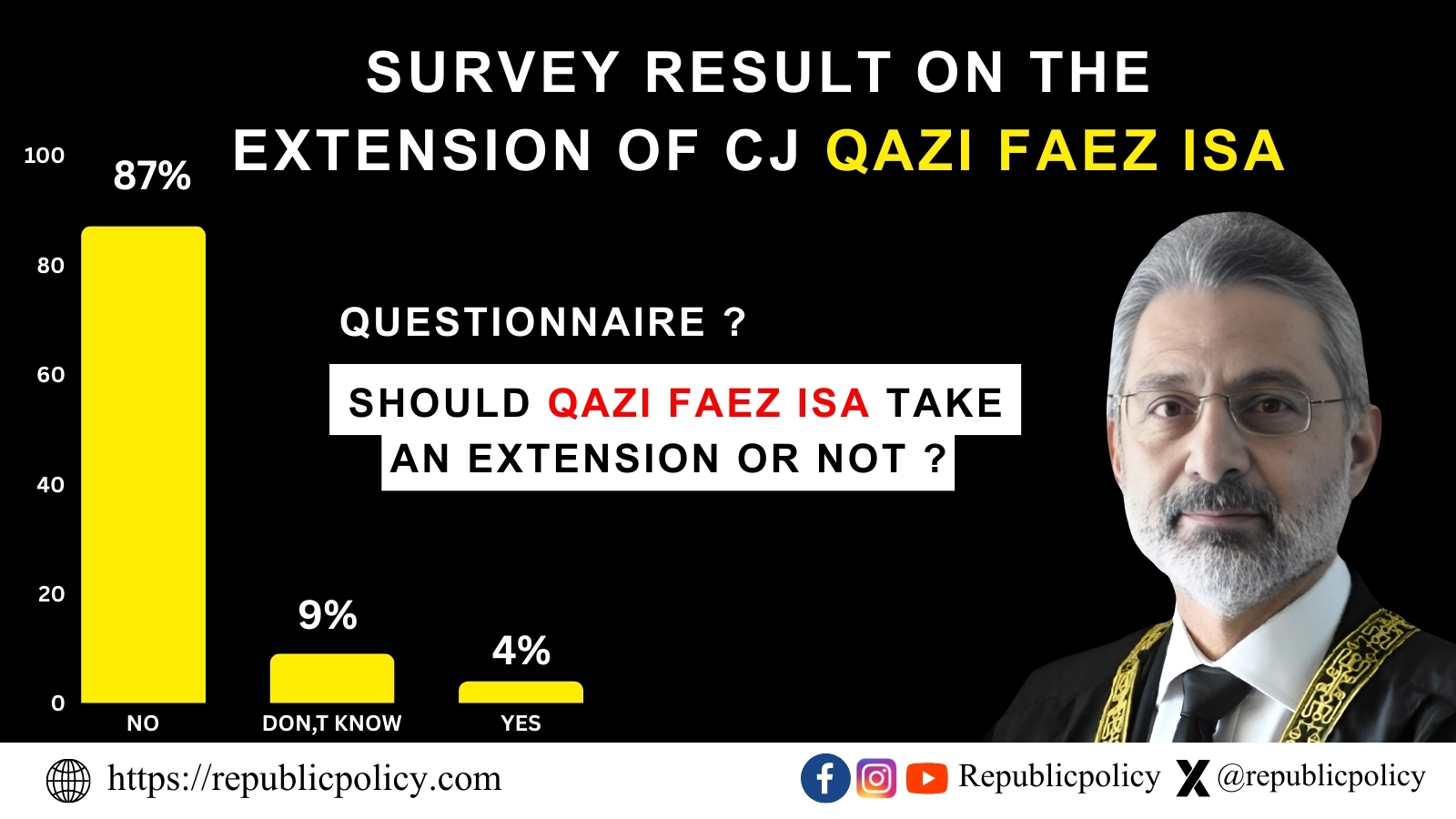Mubashir Nadeem, Mudassir Rizwan, Amir Khan & Haroon Assad
Public Opinion on the Extension of the Chief Justice of Pakistan
Introduction:
A government has three parts: the legislature, the Executive branch, and the Judiciary. Pakistan is a federal state with parliamentary governance. Therefore, the executive branch emanates from the legislature and remains accountable to it. Ensuring checks and balances between the former and the Judiciary is also essential. There is a national debate about judicial activism, reforms, and the extension of Qazi Faez Esa. Accordingly, it is necessary to measure a qualitative pulse from those people who are directly or indirectly linked to the Judiciary in Pakistan.
The following report presents the findings of a targeted survey conducted by Republic Policy Think Tank to gauge public opinion on the extension of the tenure of the current Chief Justice, Qazi Faiz Esa, as the Chief Justice of Pakistan. The survey aimed to collect information from specific target groups, including lawyers, bureaucracy, teachers, and members of civil society, to gain insights into their perspectives on this significant issue of public importance.
Methodology:
The targeted survey was conducted from 23-09-2024 to 25-09-2024, with a sample size of 2,200 respondents from all four provinces and the Islamabad capital territory. The survey used a straightforward questionnaire with a single key question:
“Should Qazi Faiz Eesa take an extension as the Chief Justice of Pakistan?”
The respondents were asked to choose from three options: “Yes,” “No,” or “No Response.” The on-field volunteers and teams of Republic Policy Think Tank took the responses. It is primarily an on-field survey. Social media pulse is not included. Secondly, the answer is sought from the professionals who are associated with the working of the Judiciary.
Pl, subscribe to the YouTube channel of republicpolicy.com
Findings:
The findings of the survey revealed compelling insights into professional sentiment regarding the extension of Chief Justice Qazi Faiz Esa. The data indicated that 87% of the respondents categorically opposed the idea of the present Chief Justice taking an extension. This overwhelming majority reflects a strong stance against the extension. Moreover, 9% of the total respondents chose not to respond to the question, indicating a level of reservation or neutrality. Only 4% of the respondents expressed support for Qazi Faiz Esa taking an extension as the Chief Justice of Pakistan.
Analysis:
The survey results reflect a clear and significant opposition to the extension of Chief Justice Qazi Faiz Esa’s tenure. The overwhelming 87% of respondents who opposed the extension demonstrated a strong sentiment within the surveyed groups. The relatively low percentage of respondents supporting the extension (4%) suggests a minority viewpoint, while the 9% who chose not to respond indicate a level of indecision or reservation on the issue. The findings of the survey are one-sided and show the trend exclusively.
It is important to understand the questionnaire and the people who are asked, the respondents. In this survey, the respondents are primarily associated with governance. Therefore, their opinion is direct and precise. Most importantly, there is a consensus among judicial, uniform, and civil servants that the culture of extensions should not be promoted as it negates the merit and promotion chances of junior officers. The respondents, the bureaucrats, judges, uniform persons, lawyers, professionals and others, believe that organizations are more important than personalities. Hence, the opinion is measured from a specified target group. It is not a mass opinion.
Mass opinions are continually significant. However, there is so much polarization. Therefore, specialized opinions have been sought from the specialized people associated with governance and the judiciary.
Conclusion:
The survey findings highlight a prevalent sentiment against the extension of Chief Justice Qazi Faiz Esa’s tenure among the surveyed groups, including lawyers, bureaucracy, teachers, and members of civil society. The surveyed groups can also be termed as intelligentsia or civil society, thinking that Qazi Faez Esa should not take an extension. Furthermore, it is also a dominating opinion that extension laws should also be repealed and extension appointments should not be made as these transgress merit, transparency and administrative values. The data provides valuable insights into professional opinion on this crucial matter and can serve as a reference for policymakers and stakeholders. The survey results underscore the importance of considering public sentiment and viewpoints when addressing key appointments and decisions within the Judiciary. Lastly, it is measurement of opinion is sought from specialized and targetted group, therefore, the error is less than 10 percent unlike mass or constituency surveys.
Overall, the targeted survey successfully captured the perspectives of the specific demographic groups and provided a comprehensive understanding of public opinion on the extension of the Chief Justice of Pakistan.
Earliar, Republic Policy conducted the first ever constituency based surveys in Pakistan. The RP surveys genuinely reflected the will of the people.
















